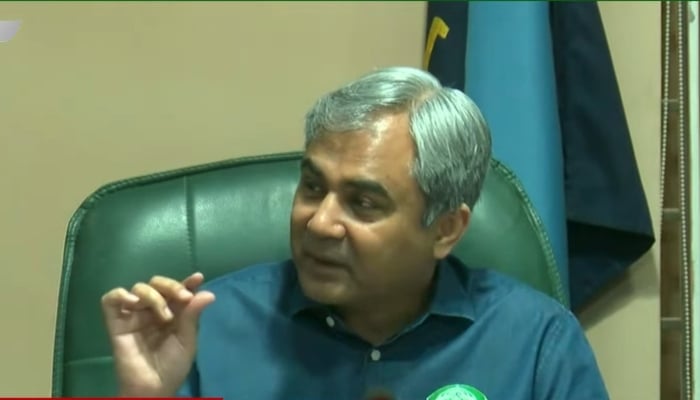Investigation points towards India’s involvement in Amir Tamba’s attack: interior minister
India was involved in four other killings as well prior to this, says Mohsin Naqvi
LAHORE: Interior Minister Mohsin Naqvi on Monday said initial investigation into attack on Amir Sarfraz Tamba, who allegedly killed Indian terrorist Sarabjit Singh in 2013, pointed towards India’s involvement.
Talking to journalists at the Federal Investigation Agency (FIA) office in Lahore, Naqvi said police were probing the incident wherein Tamba was attacked and as yet, they suspected India’s embroilment in it.
“India was involved in four other killings also prior to this. Nevertheless, it will not be suitable to say anything conclusively until the investigation is complete but this attack is on the same pattern,” he said.
In April 2013, Tamba and Mudasir Munir allegedly attacked Sarabjit Singh with bricks and iron rods in Kot Lakhpat jail. Singh was sentenced to death for a series of bomb attacks that killed 14 people in Lahore and Faisalabad in 1990.
On December 14, 2018, a sessions court in Lahore acquitted Tamba and Munir of the charge of killing Singh and ordered their release after all witnesses retracted their statements.
Tamba, 45, was unmarried and lived with his brothers in a five-marla house in Islampura. He was a spice dealer.
India admits to carrying out killings in Pakistan
During a televised interview on April 5, Indian Defence Minister Rajnath Singh admitted to the Prime Minister Narendra Modi-led government's policy of orchestrating killings in Pakistan.
He said India will enter Pakistan to kill anyone who escapes over the border after trying to carry out terrorist activities in the country.
The minister’s comments had come a day after the British publication, The Guardian, revealed in a report that the Indian government had killed about 20 people in Pakistan since 2020 as part of a broader plan to eliminate terrorists residing on foreign soil.
The report in the UK paper came months after Canada and the United States accused India of killing or attempting to kill people in their countries.
"India always wants to maintain good relations with its neighbouring countries ... But if anyone shows India the angry eyes again and again, comes to India and tries to promote terrorist activities, we will not spare them," Singh said.
Pakistan on April 6 denounced Indian defence minister's comments, terming them as “hyper-nationalistic sentiments” fuelled for “electoral gains”.
Reacting to the Indian minister’s statement, the Foreign Office said: "India's ruling dispensation habitually resorts to hateful rhetoric to fuel hyper-nationalistic sentiments, unapologetically exploiting such discourse for electoral gains."
The FO had said such myopic and irresponsible behaviour not only undermined regional peace but also impeded the prospects of constructive engagement in the long term.
"Pakistan has always demonstrated its commitment to peace in the region. However, our desire for peace should not be misconstrued. History attests to Pakistan's firm resolve and ability to protect and defend itself," the statement read.
According to the FO, Pakistan, on January 25, provided irrefutable evidence, elucidating India's campaign of extrajudicial and transnational assassinations on Pakistani soil.
"India's assertion of its preparedness to extra-judicially execute more civilians, arbitrarily pronounced as 'terrorists', inside Pakistan constitutes a clear admission of culpability. It is imperative for the international community to hold India accountable for its heinous and illegal actions," it had added.
The FO had reiterated Pakistan's resolution in its "intent and ability to safeguard its sovereignty against any act of aggression, as demonstrated by its robust response to India's reckless incursion in February 2019, which laid bare India's hollow claims of military superiority."
-
Security forces gun down 30 terrorists in multiple IBOs in KP: ISPR
-
MQM-P calls for new province in Sindh
-
US report validates Pakistan military edge over India: PM
-
Banned TTP poses serious threat to Pakistan security: UNSC panel
-
CM Afridi clarifies remarks on by-poll after ECP requests army deployment
-
Dubai sees 3.2m Pakistani passengers in 2025 as airport sets new milestone
-
Security forces kill 23 Indian proxy terrorists in KP's Kurram
-
Pakistan to construct island to boost oil exploration: report












